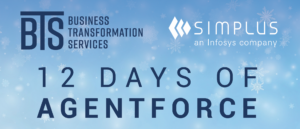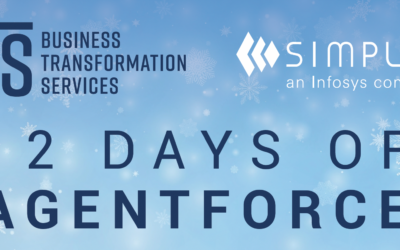A Glassdoor survey found that 67% of job seekers consider workplace diversity an important factor when considering employment opportunities, and more than half of current employees want their workplace to do more to increase diversity.
As more employees hope to show more of themselves, their personal interests, affiliations, even physical or mental challenges, in the workplace, the need for acceptance for that diversity is an essential part of today’s workplace culture. And that is where Salesforce is blazing a trail for making inclusion and diversity a mainstream topic for corporations.
In the spirit of gratitude, here are four ways Salesforce helps prove that promoting diversity in the workplace is good for business.
1. Diversity improves employee morale
In a special Salesforce report, “The Impact of Equality and Values Driven Business,” surveys revealed that employees who feel their voice is heard at work are nearly five-times (4.6X) more likely to feel empowered to perform their best work. In addition, employees who say their company provides equal opportunities are nearly four times (3.8X) more likely to say they are proud to work for their company.
“Studies show that employees who feel valued rather than marginalized are more likely to be productive, innovative, motivated, and assertive. They take more risks, and they challenge or suggest more ideas,” says Tony Prophet, chief equality officer at Salesforce and Nellie Borrero, global inclusion and diversity managing director at Accenture. “When companies focus on freeing employees from spending time analyzing how they are perceived and working out how to fit in better, it empowers them to perform at their full potential.”
2. Encourages a variety of thought processes and perspectives
Although diversity is commonly defined by nationality or gender, companies like Salesforce prove that hiring people with different personalities or those at varying stages of their professional career offer a treasure trove of contrasting points of view.
“A combination of different team personality types can create a stronger, more balanced workplace,” explains Sampson Quain. “Employees who are quiet and introverted often help to stabilize things at work, but workers who are risk-takers can provide the spark necessary to try new things, develop bolder ideas, and suggest improvements that can boost efficiency.”
Quain cautioned against hiring too many of the same personality types, explaining that a team filled with the same personalities will focus on certain tasks but often overlook other equally important tasks. “Working with different people who have a mix of personalities helps compensate for individual strengths and weaknesses,” says Quain.
3. Improves company brand and promotes a global appeal
There’s a term for designing a brand that encompasses the communities it serves. It’s called Inclusive Marketing, and it’s just as warm and fuzzy as it sounds. “We define inclusive marketing as creating content that truly reflects the diverse communities that our companies serve,” says Alexandra Siegel of Salesforce. “It means that we are elevating diverse voices and role models, decreasing cultural bias, and leading positive social change through thoughtful and respectful content.”
Inclusive marketing adds a warm, welcoming feel to the workplace. But focusing on customer-centric marketing pays off, as well. The U.S. Census predicts the United States will be a multicultural majority nation by 2044, meaning that African Americans, Asian Americans, and Hispanics will comprise 50 percent or more of the population. This evolving consumer base has a spending power of $3.2 trillion.
“We believe that our responsibility as marketers is to relay our brands’ messaging in a way that resonates with people from all backgrounds, regardless of race, ethnicity, gender identity, age, religion, ability, sexual orientation, or otherwise,” says Siegel.
4. Create role models for future business leaders
What’s the secret to building a future generation of strong leadership? Role models.
Just as consumers want to see their image in your marketing campaigns, they also want to relate to those sitting in your corporate seats, especially in the tech industry. “A role model is more than just a person you look up to and admire,” says David Cancel, Forbes.com contributor and co-founder and CEO of Drift. “It’s someone who can help you unlock your potential by showing you what’s possible and providing examples of how you should — or shouldn’t — behave.”
For Salesforce, filling leadership roles with women, in particular, has helped change the face (and gender) of leadership in the tech industry by promoting equality and diversity in executive positions. And they make sure to maintain that balance.
Since 2015, Salesforce has taken measures to ensure all employees are treated fairly and paid equitably for the job they perform. By funding regular company-wide audits, Salesforce gains a clear picture of the state of their workforce and accompanying pay scale. For example, the 2019 Salesforce Equal Pay Update found that 5 percent of its 35,000 employees stationed globally required adjustments toward equal pay, and these people were predominantly men.
“Having these annual audits ensures pay disparity no longer goes under the radar, which is particularly important for a company like Salesforce, which hires around 9,000 people each year,” wrote Line Caspersen, Executive Vice President of Mason Frank International. “It isn’t just about pay disparity, though. The reason Salesforce has made such a push for inclusivity is that positive action is needed across the whole tech industry to ensure more women are entering tech roles.” And those women are the inspiration for future leaders.
Even the Simplus location in Australia reflects the evolving change. Almost half (40 percent) of the Simplus AU staff is comprised of women, and we have a 50/50 split between men and women in the AU leadership team.
If you were to consider one thing to implement into your business model, realize the root of Salesforce’s success is in its willingness to listen to the evolving narrative in society. Salesforce recognizes that the changing demographic climate is merely one strategy in a company culture that is rapidly changing how we connect with each other, our customers, and our global community.















0 Comments